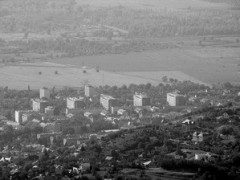Not in my backyard please!

Imagine your country is rich in an expensive, useful but dangerous resource. Imagine this resource lies near your town. What would you do? What do you think Hungarians should do?
Hungary is a small country in Central Europe that lacks significant energy resources and is strongly dependent on energy imports. So any indigenous resource is welcome. A little uranium, perhaps?
There is indeed uranium in the mountains in the southern part of the country. In socialist times, when forced industrialization was the trend, a mine opened there, giving jobs to hundreds. As we know today, environmental concerns were not fashionable back then. Finally fifteen years ago, the mine closed down when its technology became obsolete making operations non-profitable.
Hungary has one nuclear power plant (NPP) which produces around 40% of the electricity used in the country. The debate about nuclear power in the country is basically non-existant. At the decision-making level there is a consensus on the necessity of the NPP; there are even plans afoot to extend it. Yet the opponents of nuclear energy are quiet, they are not effectively organized and have not succeeded in bringing the issue to the forefront of public attention, as has happened, for instance, in Germany.
Given this situation and the steep recent rise in the price of uranium, an Australian company backed by the Hungarian government is now considering reopening the mine in Southern Hungary.
The mine definitely had advantages back then: enough jobs, very good salaries, accommodation … so it’s no surprise that a lot of people feel nostalgic about those days, especially with the present high unemployment rate in Hungary (10.7% in July 2012 with unemployment in Southern Hungary standing at 10.6% in 2010). Origo, a Hungarian news portal published a report on what locals living in the area think. Some remember the old days as many of them worked in the old mine.
Only it is impossible to forget the downside: the waste, that sometimes by accident contains radioactive elements, and the rate of cancer among workers that is significantly higher than the national average. We can be sure that the new mine will be less dangerous than the old one, with the waste staying under the earth. But is this a strong enough guarantee to satisfy everyone?
According to the news portal report, most former workers are in favour of the reopening, but all other people have mixed feelings. The mine is near the city of Pécs where a quarter called “Uranium City” was specially built for the mine workers. However, if the mine reopens, it’s major impact will be on the village of Kővágószőlős. Its mayor thinks the village should receive much better compensation than before, for example through development of local infrastructure.
A statement by the Ministry of National Development gives reassurances that the opinion of local people will be determinant in the final decision about the mine. Let’s just hope that it will be so.
Tags: Energy, Hungary, Kővágószőlős, Natural Resources, nuclear power plants, Pécs, uranium

